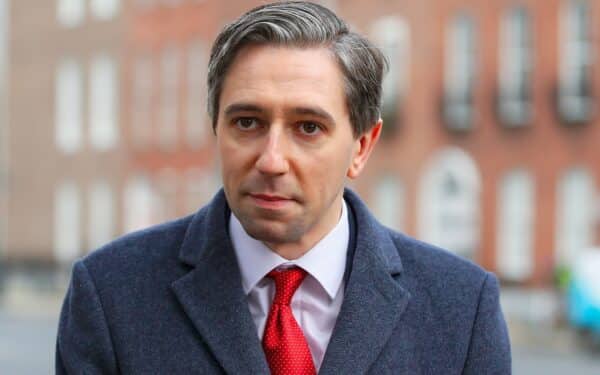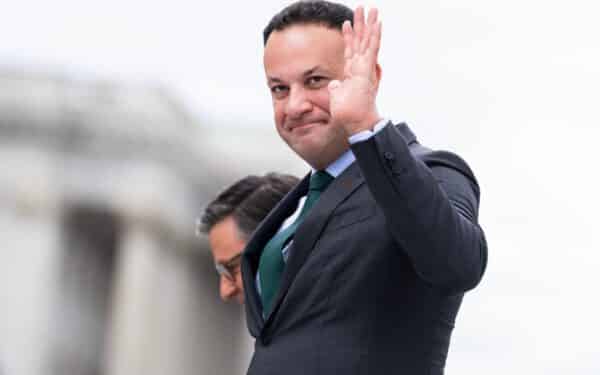This week, as part of his ongoing campaign to weaponise the issue and confound the British government, the EU Commission’s chief Brexit negotiator, Michel Barnier, spent two days preening and posturing at carefully selected venues along the Irish border.
His assistant in this project is the Republic of Ireland’s callow prime minister, Leo Varadkar, who is putting his country’s economy at risk by conniving with Brussels and gambling that taking a hardline position against the UK will ensure domestic popularity.
The pair’s latest bout of grandstanding is perhaps the most irresponsible yet.
During his visit, Barnier delivered an uncompromising message on the EU’s so-called border ‘backstop solution’ to partisan Irish nationalist audiences and failed to engage with Northern Ireland’s unionists. He insisted that, in signing up to December’s ‘joint report’ on phase 1 of the Brexit negotiations, London has agreed that Northern Ireland will remain part of the single market and customs union, even if the rest of the UK leaves.
That position, which was included in the EU’s ‘Draft WIthdrawal Agreement’, would mean customs checks in the Irish Sea and the province taking its regulations directly from Brussels rather than Westminster. In other words, it would tie Northern Ireland more closely to the Republic, economically and socially, and loosen links with the rest of the UK – an idea that appals unionists.
Barnier spoke first at the Dublin government’s ‘All-Island Civic Dialogue on Brexit’, hosted in Dundalk. This staunchly republican town, just across the border from Northern Ireland, was a favoured bolthole of the IRA during the Troubles. It was a fitting venue for the chief negotiator to threaten that the backstop will apply, if an alternative solution is not agreed by June.
Barnier subsequently met business leaders in Newry and Londonderry – equally nationalist strongholds in Northern Ireland – as unionist politicians expressed their dismay at the one-sided flavour of his schedule.
Varadkar, meanwhile, was hopping across the border, apparently uninvited by the UK government. It felt rather like he was making a point about recognising no difference between his jurisdiction and the north. The Irish prime minister said he was speaking to “normal people” about their concerns over Brexit, but the DUP accused him of “waltzing” into the province and showing “disrespect” for its constitutional position.
In an additional display of passive aggression, the Taoiseach proposed that a virulent opponent of leaving the EU, Ian Marshall, should provide a ‘northern voice’ in the Republic’s upper house, the Seanad. This self-described ‘unionist’, whose election was confirmed earlier in the week, was backed by Sinn Fein and says he’s open to the idea of a united Ireland.
These high-profile displays of disdain for British sovereignty, from both Barnier and Varadkar, confirm that the EU sees the Northern Ireland border as the decisive issue that could derail the UK’s vision of Brexit. As far as the ‘peace process’ is concerned, there’s scarcely a pretext any longer of neutrality from Brussels.
The British government is terrified by Irish nationalist sensitivities and the EU is prepared to activate those grievances in order to undermine the UK’s negotiating position. Theresa May and her ministers have promised repeatedly that a ‘hard border’ between Northern Ireland and the Republic cannot happen, so Barnier et al are doing their best to ensure this commitment cannot be kept without Britain abandoning the prospect of meaningful economic independence from Brussels.
Varadkar’s Fine Gael government too, would like the UK to stay in the single market and the customs union. It’s unlikely that it wants to absorb Northern Ireland into a 32-county republic in the foreseeable future, because the financial and social costs would be too high, but it shares the nationalist assumption that the province is not genuinely British and that it should fall increasingly under Dublin’s influence.
Yet the Republic of Ireland, just like Northern Ireland, is far more dependent on trade with Great Britain than the movement of goods across the Irish border. And despite the disproportionate amount of attention border areas have received, they contain a small minority of the island’s population.
The former Irish prime minister, Enda Kenny, had quietly instructed his officials to start work on minimising the disruption that customs checks might cause, by concentrating on electronic solutions. Then Varadkar and his vaultingly ambitious sidekick, foreign minister Simon Coveney, took over and started to carp at the British government for its apparent stupidity and sound a ‘dog-whistle’ to ugly, nationalist anglophobia.
This lack of pragmatism on Dublin’s part and its naive faith in Barnier and the Commission could yet force the UK out of the EU without any kind of trade deal. The Republic would then encounter serious barriers to its biggest European market and the British transport system, through which the vast bulk of its exports reach the rest of the world.
As Theresa May struggles to persuade her party of the need for a new customs partnership with the EU, she could certainly use a more neighbourly and supportive attitude from across the Irish Sea. If that’s not forthcoming, the government must stop deferring to Dublin and make it plain that Varadkar’s aggressive approach could bring about a hard border in Ireland and cause serious damage to the Republic’s economy.



